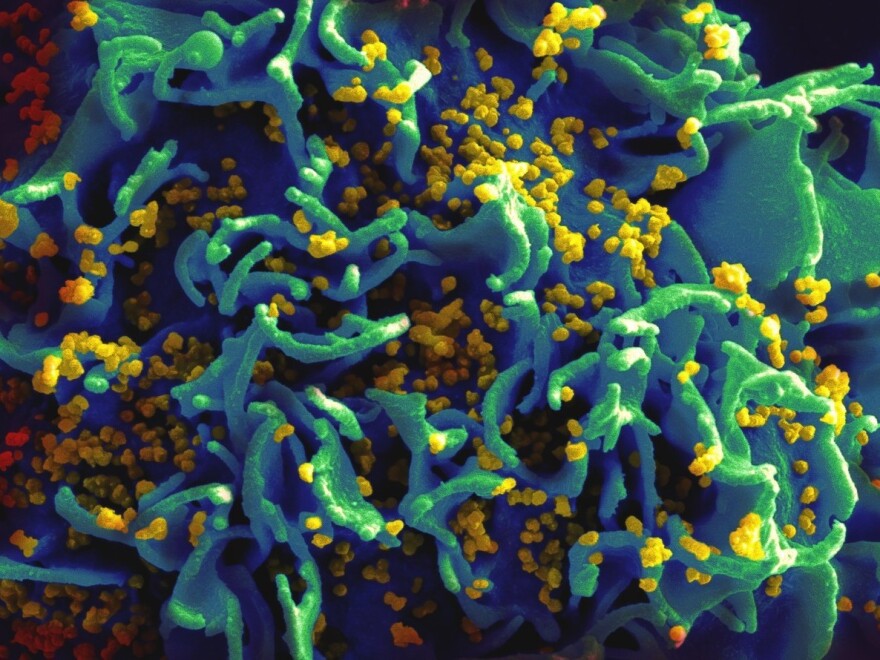Just last week AIDS researchers were excited about a Mississippi toddler whose blood has remained free of HIV many months after she stopped getting antiviral drugs – what doctors call a "functional cure."
Now French researchers confirm they've found 14 adults whose immune systems are apparently controlling HIV without medication.
They're not explicitly claiming these patients are cured, but they are calling them "post-treatment HIV controllers," in "long-term remission" from the once-deadly AIDS virus.
Unlike the Mississippi case (so far), the French patients do have HIV in their blood – but at such low levels that it takes ultra-sensitive tests not available in most labs to detect it.
The common thread linking the Mississippi child and the French patients is that they were all given combinations of potent antiviral drugs very early after they were infected with HIV – in the child's case within 31 hours, and among the adults between one and two months.
The report is in the journal PLoS Pathogens.
The picture emerging is that very early treatment can prevent the virus from establishing "reservoirs" of HIV-infected cells within the body — at least sometimes. That apparently gives the patient's immune system a fighting chance to control whatever virus remains.
Scientists consider that a "functional cure" — control of virus replication after patients stop taking antiretroviral medications. That's different from a "sterilizing cure," which is total elimination of all traces of HIV from the body.
Researchers think early treatment may also prevent HIV from multiplying to such levels that more dangerous mutants arise from the original infection.
Like the Mississippi case, the French researchers say their "long-term controllers" did not have genetic mutations known to protect against HIV infection.
And unlike the rare HIV-infected people known as "elite controllers," who spontaneously control the infection without any treatment at all, the French patients had high levels of the virus in their blood soon after infection, in the so-called "acute phase." All but two of the 14 also had the flu-like symptoms associated with acute infection.
The group includes 10 men and four women. They took combinations of antiretroviral drugs for varying times – between a year and 7.6 years, with a median time of three years. They have now been off therapy between four and nearly 10 years.
The patients either decided to stop treatment themselves or were participating in a treatment-interruption study, says lead author Asier Saez-Cirion of the Pasteur Institute in Paris.
The possibility that the French patients, known as VISCONTI Cohort, might be controlling the virus was first raised last summer at the International AIDS Conference in Washington; the new paper is the first detailed confirmation.
The French researchers have tried to estimate how many people might be potential "long-term controllers" of HIV, but the data are scant.
Among French HIV patients recorded from 1997 to 2011, they found only 756 who had been treated within six months of infection and stayed on antiviral therapy for at least a year.
According to MedPage Today, only 70 patients of these French patients are known to have had had detectable HIV in their blood before treatment and then had at least one test after they stopped treatment that did not reveal "detectable" virus. (That means at least 50 copies of the virus per milliliter of blood – the level at which HIV is considered "undetectable" by the usual "viral load" test.)
By that rough measure, the French researchers estimate that perhaps 15 percent of HIV-infected patients might possibly be capable of controlling the virus without medication, after a period of very early therapy.
The practical implications, however, are very limited. Most HIV patients and their doctors don't know for sure when they were infected, and thus most are not given treatment within a couple of months, as the VISCONTI patients were.
However, there is a drive toward more widespread and frequent HIV testing of at-risk patients and prompt treatment of those who test positive. So it's possible that in the future more infected patients might have a shot at subduing the virus early on.
But scientists and HIV doctors will want to know a lot more about exactly what distinguishes the potential controllers before they'll be comfortable advising anybody to stop taking their antiviral drugs.
Copyright 2021 NPR. To see more, visit https://www.npr.org.




